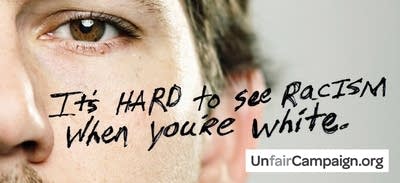Edgy posters, billboards come out against racism in Duluth

Community organizations in Duluth launched a new anti-racism campaign Tuesday.
The "Unfair Campaign" is intended to draw attention to advantages white people enjoy because of their skin color. Fifteen Duluth organizations kicked off the campaign with an event at City Hall.
A 2010 survey found Duluth residents viewed the city as less hospitable to racial and ethnic minorities, immigrants, young adults without children, and talented college graduates looking for work than other comparable cities.
The campaign hopes to address such findings and spur dialogue about white privilege, and features edgy posters and billboards throughout Duluth, as well as speakers and community events.
Create a More Connected Minnesota
MPR News is your trusted resource for the news you need. With your support, MPR News brings accessible, courageous journalism and authentic conversation to everyone - free of paywalls and barriers. Your gift makes a difference.
The conversation is long overdue, said Carl Crawford of Lake Superior College and an African-American resident of Duluth for more than 25 years.
"For those of us who have been here, lived here, we know what we feel when we come into certain places," Crawford said. "It's here, we live it, we breathe it, we feel it. We base how we're going to get dressed in the morning on how our next interaction with other people is going to go."
The first goal of the campaign is to call attention to racial disparity in a city that is 90 percent white, said Ellen O'Neill, executive director of the Duluth YWCA, which spearheaded the new initiative.
"We swim in a sea of whiteness, it's the norm," O'Neill said. "If we're white we don't have to think about it, we don't see it. So the first step is getting white people to see it."

